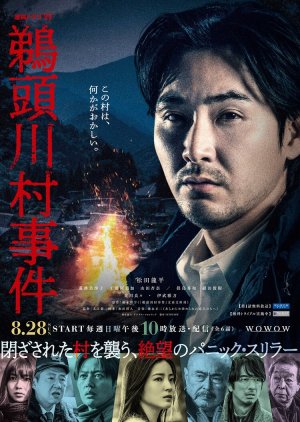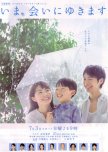
Gripping and dark!
This drama had me invested from the get go. Anything based on folklore traditions, urban legends, cult rituals are my pick and this is what it is based on. The plot revolves around a superstitious ritual, practiced for eons by the residents of a depopulated village Uzukawa to appease the god of the village.The reason I was hooked from the start was the introductory section and a folk rhyme in a child’s voice. It gave that eerie feeling I was looking for. Had a peculiar, dense, uneasy atmosphere around it which I loved and also it’s cinematography.
Each actors played their characters well. But the actor who played the character of Yahagi Daisuke, it will be hard for me to imagine him as a different person.
I also loved the bgm which beautifully creates a mysterious and an uncanny aura around it..
It was short with no draggy fillers.
It was dark, weird as well as sickening.
It’s better to avoid if you are not fond of dark drama filled with uneasiness.
But if you want to experience something weird, tensed and disturbing as well, then you are up for it. I would definitely recommend this drama to them.
I thoroughly enjoyed it.
I usually do not rewatch thrillers, as I have already experienced all the thrills and the mystery is known. So, it’s difficult for me to rate it for rewatch value.
But for one time experience, it was quite good.
Considerați utilă această recenzie?

Hommes de paille
Halloween est le moment de sortir tout un tas de dramas horrifiques et c'est souvent le genre : "village reculé dans la montagne, habité par de veilles légendes et des déficients mentaux" qui ont la cote au Japon. Rien d'étonnant, vu la richesse du folklore nippon. Mais après des décennies de mangas, de séries, de films et autres romans, que peut encore apporter de neuf un drama prenant place dans l'un des derniers villages isolés de l'archipel. Écrasé par le poids des traditions et la loi du silence.Tout y est dans Uzugawamura Jiken. Une mystérieuse disparition. Un médecin à la recherche de son épouse rappelant Silent Hill ! Un village accessible par une seule route coupée après la tempête. Des habitants fleurant bon la folie et la xénophobie. Un folklore et une divinité qu'il faut honorer pour obtenir sa clémence. Les bases semblent être une fois de plus les mêmes que chaque année. Alors faut-il vraiment offrir, que dis-je sacrifier du temps à ce drama ?
La question essentielle est, allons-nous être surpris ? Ce qui justifierait une telle offrande de notre temps si précieux. D'autant plus que le casting ne reflète pas le bildboard actuel des acteurs bankables. Il y a bien Kudo Asuka, que j'adore et qui trop souvent est cantonné à des faire-valoir. Il a ici un rôle de leader de la révolution, défenseur de l'oppresseur, face à une parfaite pourriture, interprétée par Ibu Masato. Excellent dans son rôle de patriarche. Rapprochant sa famille, employeur de toute la vallée, d'une mafia immonde et méprisante envers le reste du village. Reste du village qui ne voit d'autre salut que de s'écraser ou le quitter.
La galerie de personnages est cinglante. Le fils à papa sire-pompes. Un autre de ses fils, bien jeune, vivant une histoire d'amour à la Roméo et Juliette. Et bien sûr l'exécutant complètement givré que l'on soupçonne de tous les meurtres et autres saloperies dès les premières minutes. Ce comportant comme une bête dès son apparition, c'est tout le village qui sombrera dans une folie collective. Mais laquelle ?
Car on est loin de se douter, en seulement 6 épisodes, de la véritable personnalité des protagonistes. On est bien sûr assez vite déconcerté par le calme du principal, interprété par Matsuda Ryuhei. Son jeu semble un peu hors sujet, au vu de ce qu'il vit, et ça vous donnera un peu d'irritation à la rétine. Tout comme l'effigie de paille qu'est la divinité Eikichi, au cœur du scénario. Alors que la mise en scène et l'image sont de haute volé, cette représentation grotesque me fait de la peine, plutôt que d'inspirer la peur. Mais c'est peut-être voulu finalement. Car les habitants sont des caricatures d'eux même et c'est bien sûr pour mieux nous retourner dans tous les sens dans les derniers épisodes. Le scénario prend de l'ampleur à la fin et nous fait pardonner toutes les errances et les absurdités des premières minutes.
Si vous n'avez pas le courage d'attendre vraiment le dénouement scénaristique, sachez quand même, que les paysages et la mise en scène à eux seules valent le coup de visionner les premiers épisodes. En plein Momiji (couleurs d'automnes), les montagnes de Nagano sont flamboyantes. On regrettera, à peine, une image un peu trop sombre, gâchant un peu le plaisir. Le village, en partie détruit par la tempête, est parfaitement reconstitué et on y croit comme si on regardait un reportage télé. La musique, sombre et hypnotique, rajoute de la dépression à toute cette ambiance automnale, qui passe progressivement des couleurs chaudes au gris. La comptine d'Eikichi est entêtante et flippante à souhait. Même si on est habitué à ce genre d'artifice, ce qui pourrait du coup vous faire rire plutôt que frissonner. Connaissant trop bien les ficelles des horrors-dramas.
À la fois classique et à la recherche d'un scénario horri-ginale, Uzugawa jiken peine un peu à trouver d'intérêt sur la longueur. Il aurait fait un excellent film, mais en 5 h (6 x 45 min), il peut lasser l'habitué des folklores de village maudit. Reste quand même ses paysages et des révélations qui peuvent vraiment surprendre. Vous pouvez donc offrir à la divinité J-Drama 5h de sacrifice de votre précieux temps pour apaiser votre soif de Japon.
Considerați utilă această recenzie?

Această recenzie poate conține spoilere
Potentially Enthralling
(1) Story:Drama was adapted from a Japanese novel* set around the 1980s, but the drama spun 12 years before (i.e. 2010) to when it was aired in 2022. This possibly led to a number of questions on how believable it is in modern Japan, even if it was set in a village, e.g.:
- Nothing set up for contacting public agencies in an emergency, i.e. not reliant on phone lines, etc.
- Only one policeman in the village with no contact to a larger police post in Japan’s Nagano prefecture.
- No emergency power supply beyond the Yahagi household? Beyond the richest family in the village, surely the town hall should have something set up by the prefecture government considering Nagano is known for its mountains, hot springs, etc.
[*Novel was published in June 2018, and authored by Kushiki Riu, whose novel "Haunted Campus" in 2012 won the Japan Horror Story Grand Prize Readers' Award.]
(2) Atmosphere:
The atmosphere was well set up, and reminds one of the Showa era**, reminiscent of Yokomizo Seishi's *** worldview.
[**Showa = 25 Dec 1926 – 07 Jan 1989.
***Japanese mystery novelist, known for creating the fictional detective Kindaichi Kosuke.]
This said, it was neither quite horror nor suspense, as it is a little subtle in both categories.
- From the beginning, the bus driver hinted the village to be cursed but it was not clear in what way.
- The villagers appear to know that something was broken, yet the younger ones (especially a few who obviously appear to be quite daring or strong-minded) for some reason, did not leave the village.
It's a pity that the atmosphere was not further expanded upon, despite the good set-up:
- “Eikichi" was never explained…who is Eikichi? why was this name used? what's the relation to the village?
- The duration... why the need for a 3-day prayer every 12 years?
- The "sacrifice"… any rationale (beyond the 3 main human desires) even if such forms of sacrifice are not uncommon in folktales?
- The ritual… why 4 straw men (4's pronunciation in Japanese makes it a synonym to death)?
(3) Twist:
The ending of Episode 5 (repeated in the beginning of the last episode) was unexpected in a positive way, given how the previous episodes tried to distract or suggest otherwise, about the truth behind Hitomi's death.
(4) Motives:
In terms of the truth behind the serial murders, the motivations could have been stronger or one would probably require a more “romantic” mindset, because the antagonist was not portrayed as a narcissist or some psychopath:
(a) The relationship with Hitomi… It would have been more understandable if they had a deeper relationship (e.g. she saved his life) as it is a little hard to grasp how he could go to such an extent (in anger or yearning) when:
i) He did not know Hitomi's death status;
ii) He mentioned that Hitomi is happily married;
iii) The first victim appears to be a close friend of his since childhood (this in comparison to Hitomi who already left the village for years and did not seem to have a very close relationship with him at all).
(b) Alternatively, the hatred for the other household or villagers in general could have went deeper, e.g. revenge for his family or himself for a very difficult/abusive childhood.
If one needed to understand and justify his extreme choices because he "loved" his village so much (that those who destroy the village deserve death) or he hated the deep-rooted sense of hierarchy or division (between people born in the countryside versus city), it had not been clear in the drama.
(5) Overall:
WOWOW did not disappoint:
- The casting and acting was good.
- The scenery and setting was very suitable for the story-line.
- The music drives a eerie feel, sometimes giving one goosebumps, befitting of the setting.
- Episode 1 did make one want to find out more about the mysteries, and left one gripping to continue.
Perhaps one needs to read the novel to appreciate the story better, assuming there are more insights to the village in the original novel.
Considerați utilă această recenzie?







































